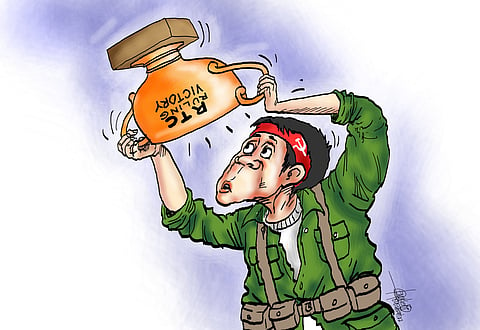
- NEWS
- the EDIT
- COMMENTARY
- BUSINESS
- LIFE
- SHOW
- ACTION
- GLOBAL GOALS
- SNAPS
- DYARYO TIRADA
- MORE

The recent ruling of the Regional Trial Court of Manila that the Communist Party of the Philippines and the New People's Army are not terrorist organizations is a hollow victory for local communists.
That ruling emanated from a case filed by the Department of Justice back in 2018. In seeking a judicial declaration that the CPP-NPA are terrorist organizations, the DoJ cited at least nine acts of unmitigated violence committed in Mindanao by the CPP-NPA. Those atrocities include five murders, an assassination attempt, an abduction, an ambuscade and rampant arson.
RTC Judge Marlo Magdoza-Malagar opined that the CPP-NPA are rebel groups, not terrorist organizations.
According to the judge, the numerous atrocities committed by the CPP-NPA did not cause "widespread and extraordinary fear and panic," because they were simply "pocket and sporadic" and "ripples in a much larger pond," which occurred in limited areas in Mindanao.
Political analysts find it incredible that the atrocities cited by the DoJ are not enough grounds for a judicial declaration that the CPP-NPA are terrorist organizations.
One analyst asked, "What does the judge want to see before she is convinced that the CPP-NPA are terrorist groups?
Does she want the entire archipelago to be consumed by atrocities before she declares the CPP-NPA as terrorist organizations?"
Another commentator said, "Based on the trial court's unrealistic standards, even if the CPP-NPA burned the entire island of Mindanao, that still will not qualify them as terrorist organizations!"
Still another observer wonders why the trial court did not consider the CPP-NPA as terrorist organizations when many countries have already classified the two as terrorist groups.
In fact, the involvement of the CPP-NPA in the 1971 Plaza Miranda bombing in Quiapo, Manila is public knowledge.
Because of the trial court's decision, the propaganda bureau of the CPP-NPA, particularly the National Democratic Front, will have a heyday praising it as "justice well deserved."
The National Union of People's Lawyers, a group seen by many as sympathetic to the local communist movement,
commended the judge for being an "independent" jurist. Surprisingly, the group said it felt "vindicated" by the decision of the court even if it did not represent the CPP-NPA in the trial.
The CPP-NPA-NDF troika praises only those court rulings in their favor. Judgments that do not sit well with them are quickly condemned by the troika. One example can be seen in the reaction of the troika's minions to the decision of the Supreme Court upholding the constitutionality of the Anti-Terrorism Act.
Had they lost in this case filed by the DoJ, the CPP-NPA-NDF troika would have summarily condemned Judge Magdoza-Malagar.
As mentioned earlier, the RTC decision is a hollow victory for the CPP-NPA. Although the trial court did not consider the CPP-NPA as terrorist organizations, the court acknowledged that the two groups are still engaged in rebellion against the government.
Under existing laws, rebellion remains a criminal offense. Thus, the CPP-NPA may not be terrorist organizations in the eyes of Judge Magdoza-Malagar, but they remain outlaws.
The CPP-NPA are not only outlaws; their cadres in the countryside are extortionists. They demand the payment of "revolutionary taxes" from industries and businessmen operating in the provinces.
There are many confirmed news reports about NPA cadres burning factories and equipment in the countryside, which belong to entrepreneurs who refuse to pay the "revolutionary taxes" to the NPA's extortion army. Some of those businessmen are even killed. If all that doesn't qualify as some kind of terrorism, what does?
Perhaps somebody should direct that question to Judge Magdoza-Malagar.
Most of those "revolutionary taxes" are sent to CPP founder Jose Ma. Sison to finance his luxurious lifestyle in his self-imposed "exile" in Utrecht, in The Netherlands.
The DoJ sees the ruling as a temporary setback. Observers believe that the DoJ will seek a reconsideration of the trial court's ruling, and even elevate the matter to the Supreme Court.
